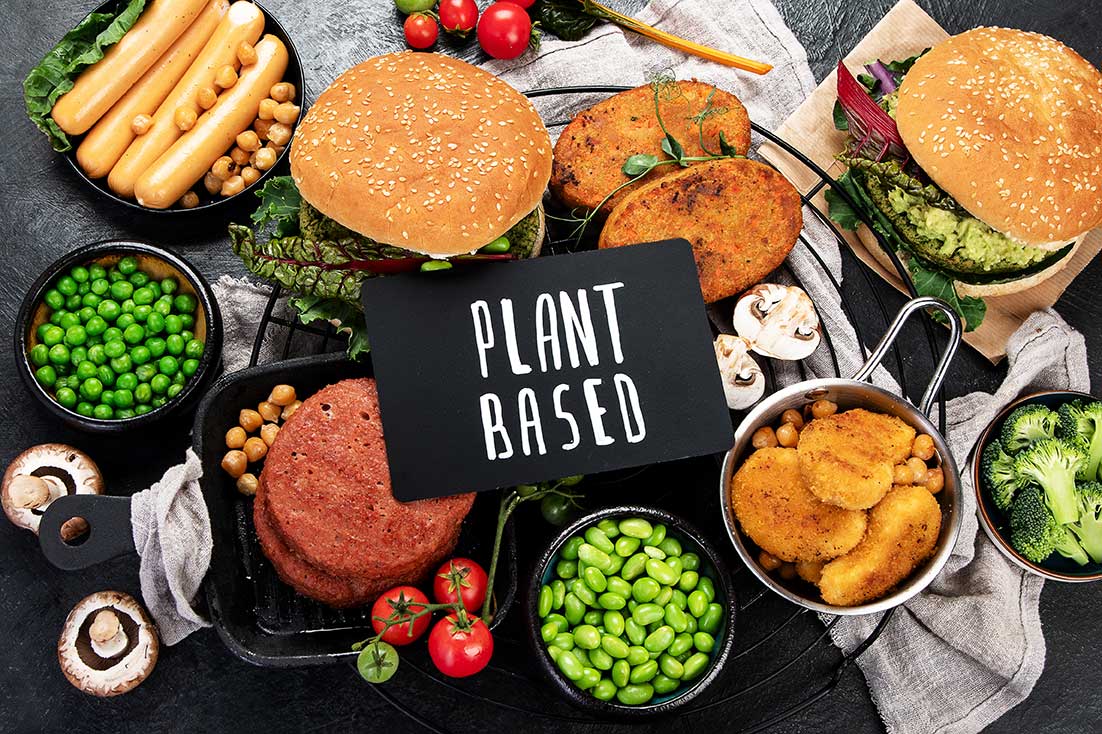Everything About Healthy Food: Benefits of Embracing Plant Based Options
The conversation surrounding plant-based diets has obtained significant attention in recent times. Many individuals are exploring the potential wellness benefits, nutritional benefits, and environmental impacts connected with these dietary selections. As individuals end up being a lot more knowledgeable about their food's influence on health and sustainability, inquiries arise regarding the functionalities of taking on such a way of life. What certain modifications can one anticipate, and just how might these selections reshape not just personal health however additionally the earth's future?
Recognizing Plant-Based Diet Plans
Several people connect plant-based diets mainly with vegetarianism or veganism, these diet regimens can incorporate a large range of eating patterns that focus on whole, minimally processed plant foods. Such diets frequently consist of fruits, veggies, whole grains, beans, seeds, and nuts, while eliminating or restricting animal products. This flexibility permits people to customize their nutritional choices according to personal choices and dietary needs. Some might adopt a mostly plant-based diet regimen while still periodically consuming meat or milk, typically described as a flexitarian technique. The emphasis stays on including even more plant foods, which can bring about a varied range of tastes and meals. Comprehending these different interpretations of plant-based consuming is essential for appreciating its accessibility and charm in contemporary food culture.
Health And Wellness Conveniences of Plant-Based Foods
The wellness advantages of plant-based foods are significant, offering a nutrient density benefit that sustains general wellness. Research study shows that these foods can enhance heart health and play an important function in effective weight management. By incorporating much more plant-based choices, people might boost their nutritional options and promote long-lasting wellness.
Nutrient Thickness Benefit
Nutrient thickness plays an important role in the health and wellness advantages of plant-based foods, making them an engaging choice for those seeking a well balanced diet plan. Plant-based foods, such as fruits, vegetables, beans, nuts, and whole grains, are typically abundant in vital vitamins, minerals, and anti-oxidants while being lower in calories. This high nutrient thickness enables individuals to take in fewer calories while still satisfying their nutritional demands. Furthermore, these foods are packed with nutritional fiber, advertising gastrointestinal health and helping in weight monitoring. By integrating nutrient-dense plant-based choices, consumers can boost their general health, support their body immune systems, and minimize the risk of chronic diseases. Eventually, the nutrient density of plant-based foods highlights their significance in a health-conscious way of life.
Heart Wellness Improvement

Weight Administration Assistance
In enhancement to promoting heart health, a plant-based diet can significantly help in weight management. This nutritional strategy highlights entire foods such as fruits, veggies, legumes, nuts, and entire grains, which are typically reduced in calories and higher in fiber compared to animal-based items. The high fiber material aids boost satiation, reducing general calorie intake. Plant-based diet regimens are usually abundant in necessary nutrients while low in undesirable fats, making it less complicated to keep a healthy and balanced weight. Study shows that people who take on a plant-based lifestyle have a tendency to have lower body mass indexes (BMIs) and experience even more effective weight loss compared to those that consume meat-heavy diet plans. As a result, embracing plant-based choices is a strategic choice for reliable weight management
Nutritional Worth of Plant-Based Components
Plant-based active ingredients are abundant in crucial nutrients, supplying a diverse range of vitamins, minerals, and antioxidants that add to total wellness. A contrast of healthy protein sources reveals that while pet items are typically considered as superior, many plant-based choices give ample healthy protein and other beneficial compounds. Understanding the nutritional value of these ingredients can assist individuals make notified dietary selections.
Necessary Nutrients in Plants
Nutrient-rich active ingredients discovered in plants offer a varied variety of essential minerals and vitamins that add considerably to total health. These components are rich in vitamins A, C, and K, which support immune feature, vision, and blood clot, specifically. On top of that, plants offer crucial minerals such as magnesium, potassium, and calcium, essential for heart health, muscular tissue feature, and bone stamina. The presence of fiber in plant-based foods help food digestion and advertises a healthy and balanced digestive tract microbiome. Antioxidants, discovered generously in vegetables and fruits, help battle oxidative stress and minimize swelling. Furthermore, many plant foods are reduced in calories yet high in nutrients, making them an excellent choice for those seeking to preserve a healthy weight while making certain excellent nutrient consumption.
Comparing Healthy Protein Sources
Healthy protein Find Out More resources differ significantly in their dietary accounts, with plant-based active ingredients providing distinct benefits. Unlike animal proteins, which usually include saturated fats and cholesterol, plant proteins tend to be reduced in these undesirable components. Legumes, nuts, seeds, and whole grains are abundant in crucial amino acids, fiber, vitamins, and minerals. For example, lentils offer high healthy protein material alongside substantial iron and folate, while quinoa is a total healthy protein, supplying all 9 necessary amino acids. In addition, plant-based proteins are typically come with by anti-oxidants and phytochemicals that support total wellness. The change to plant-based healthy protein resources not only improves dietary consumption however additionally straightens with lasting nutritional practices, reducing environmental influence and promoting long-term health benefits.
Ecological Impact of Plant-Based Eating
As understanding of climate change expands, many people are discovering sustainable nutritional options that can greatly reduce their ecological impact. Plant-based consuming has become a considerable contributor to minimizing greenhouse gas exhausts, which are largely connected with animals production. The cultivation of fruits, vegetables, grains, and vegetables commonly requires fewer sources, such as water and land, compared to pet farming. Additionally, plant-based diet plans can result in reduced logging, as much less land is required for grazing animals or expanding animal feed. By moving towards plant-based options, consumers can sustain biodiversity and advertise healthier environments. Overall, welcoming plant-based consuming not only advantages individual health yet additionally represents an important step towards ecological sustainability and conservation initiatives.
Conquering Common Misconceptions
While numerous people acknowledge the advantages of a plant-based diet plan, several misconceptions usually discourage them from fully accepting this way of life. A typical idea is that plant-based diet plans lack adequate protein; nonetheless, various plant resources, such as vegetables, nuts, and tofu, offer sufficient healthy protein. In addition, some presume that this diet plan is expensive, when in fact, staples like beans, rice, and seasonal veggies can be rather cost effective. Another mistaken belief is that plant-based eating is excessively limiting, whereas it in fact offers a diverse selection of foods and flavors. Finally, lots of worry that a plant-based diet may bring about deficiencies, yet with proper planning, individuals can acquire all essential nutrients, consisting of vitamins and minerals, while appreciating a large selection of tasty dishes.
Tips for Transitioning to a Plant-Based Way of living
Making the shift to a plant-based lifestyle can be an improving experience, though it typically calls for some guidance to browse the first adjustments. Initially, people are urged to start gradually, integrating even more fruits, veggies, vegetables, and entire grains right into their meals while lowering meat and milk usage. Dish planning is essential; preparing a regular menu can aid reduce the modification and protect against final harmful selections. Discovering cooking methods and new recipes can likewise maintain and boost the experience excitement about plant-based consuming. In addition, signing up with assistance teams or areas can supply motivation and share useful pointers. Staying notified concerning nutrition assurances balanced dishes, stopping shortages while promoting a healthy and balanced, gratifying plant-based way of life.
:max_bytes(150000):strip_icc()/EWL-plant-based-foods-with-more-protein-than-an-egg-8424134-hero-3x2-42d27feb38e94570a6e5203bb0e4e666.jpg)
Delicious Plant-Based Dish Ideas
Discovering scrumptious plant-based dish concepts can influence people to accept a much more nutritious diet regimen. One preferred alternative is a hearty quinoa salad, featuring cherry tomatoes, cucumber, and a zesty lemon-tahini More Help clothing. Another fave is a full-flavored lentil stew, packed with carrots, celery, and fragrant natural herbs, perfect for a calming dinner. For morning meal, overnight oats made with almond milk, chia seeds, and topped with fresh berries offer a healthy start to the day. Furthermore, a vivid veggie stir-fry with tofu and a selection of colorful veggies can be a quick yet satisfying dish. Velvety avocado toast on whole-grain bread, sprayed with seeds and seasonings, provides a basic yet savory treat. These dishes display the variety and richness of plant-based eating.

Often Asked Questions
Can a Plant-Based Diet Offer Enough Healthy Protein?
The concern of whether a plant-based diet can supply sufficient healthy protein prevails. Numerous resources, including beans, nuts, seeds, and entire grains, can fulfill protein requires efficiently, sustaining a nutritious and well balanced diet for people.
Are Plant-Based Diet Plans Suitable for Kid?
The suitability of plant-based diet plans for children depends upon careful planning. Adequate nutrients need to be guaranteed, including minerals, vitamins, and healthy proteins. With proper support, such diets can support healthy development and development in kids.
Just how Do I Eat in restaurants on a Plant-Based Diet?
Eating in restaurants on a plant-based diet regimen involves looking for dining establishments with varied food selections, requesting alterations, and exploring vegan-friendly options. Planning in advance and communicating dietary choices can boost the dining experience while preserving dietary options.
What Are Usual Irritants in Plant-Based Foods?
Common allergens in plant-based foods consist of soy, gluten, nuts, and seeds - Gluten Free BBQ Sauce. People following a plant-based diet plan must recognize these irritants and review tags carefully to avoid adverse responses and ensure secure intake
Can Plant-Based Diets Aid With Fat Burning?
Research study shows that adopting a plant-based diet plan might promote weight-loss due to its usually lower calorie density and higher fiber content. This mix can enhance satiation, helping people manage their calorie consumption efficiently. Numerous people link plant-based diet regimens generally with vegetarianism or veganism, these diet plans can include a wide array of eating patterns that focus on entire, minimally refined plant foods. Nutrient density plays a vital duty in the health advantages of plant-based foods, making them a compelling choice for those looking for a well balanced diet plan. Plant-based diet regimens have been revealed to noticeably enhance heart wellness, as they frequently contain elements that sustain cardio function. In enhancement to advertising heart health and wellness, a plant-based diet plan can considerably assist in weight administration. A common belief is that plant-based diet plans do not have sufficient protein; nonetheless, numerous plant sources, such as try this out vegetables, nuts, and tofu, supply sufficient healthy protein.